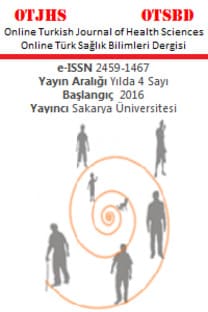Sakarya Özel Eğitim Kurumunda Eğitim Gören Çocukların Beslenme Tarzında Ebeveynlerin Bilgi ve Tutumlarının İncelenmesi
Beslenme büyüme ve gelişimin sağlanması, sağlıklı bir yaşam ve sağlıklı bir gelecek için çocukluk evresinde çok önemlidir. Otizm ve down sendromu bir takım benzerlikleri ve farklılıkları gösteren genetik hastalıklar arasında yer almaktadır. Down sendromlu veya otistik çocuklar beslenme açısından riskli bir gruptur. Bu araştırma Sakarya Özel Eğitim Kurumunda eğitim gören çocukların beslenme tarzları ve ebeveynlerin çocuk beslenmesine yönelik tutumlarının incelenmesi amacıyla planlanmıştır. 30 Gönüllü öğrenci velilerine demografik bilgiler haricinde evet/hayır içeren 17 (S1, S2,…,S17) soru sorulmuştur. Ayrıca okul çağında sıkça kullanılan 22 adet gıda maddesi tablosundaki yiyeceklerin sıklığı sorgulanmıştır. S4 (%45,2 evet ve %54,8 hayır), S8 (%41,9 evet ve %54,8 hayır), S15 (%32,3 evet ve %67,7 hayır) ve S16’ da ise (%3,2 evet ve %96,8 hayır) hayır cevaplarının oranı evet cevabına göre yüksek bulunurken diğer soruların cevaplarında evet oranı yüksek bulunmuştur. Öğün aralarında çocuğun isteklerinin karşılanmaması, çocuğun acıkınca yemek yedirilmemesi, çocuğun her gün düzenli olarak akşam yemeği yememesi aile bireylerinin çocuk besleme bilgisinde yetersiz olduğu düşünülmektedir. Bununla birlikte otistik çocukların cips, gazlı içecekler, lahmacun-pide türü gıdalara az yer verilmesi ve süt ve süt ürünleri, yumurta, kuru baklagiller ekmek ve makarna gibi yiyeceklere yönelmesi olumlu bir beslenme alışkanlığını göstermektedir.
Anahtar Kelimeler:
Özel eğitim kurumu, otizm, çocuk beslenmesi, ebeveyn tarzı, tutum
Investigation of the Information and Attitudes of Parents in the Nutrition Style of the Children Educated in Sakarya Private Educational Institution
Nutrition is very important in childhood for a healthy life, a healthy future and growth and development. Autism and Down syndrome are among the genetic diseases that show some similarities and differences. Children with Down syndrome or autistic children are at risk groups for nutrition. This research was planned to examine the nutrition styles of children educated in Sakarya Private Educational Institution and also the attitudes of parents to child nutrition. 30 Volunteer student's parents were asked 17 questions (Q1, Q2... Q17) with yes / no except demographic information. In addition, the frequency of food items in the table of 22 food items frequently used in the school age was questioned.Q4 (45.2% yes and 54.8% no), Q8 (41.9% yes and 54.8% no), Q15 (32.3% yes and 67.7% no) and Q16 (3.2% yes and 96.8% no), the rate of no answers is high compared to the answer of yes, while the rate of yes is high in the answers of other questions. It is considered that family members are not enough to feed on their children when they are not satisfied with the requests of the child for meals, when the child does not eat food with hunger, and when the child does not eat regularly every evening. However, autistic children show a positive eating habit by eating chips, sparkling beverages, pancake with spicy meat filling –pita type foods, and dieting with milk and dairy products, eggs, dry legumes, bread and macaroni.
Keywords:
Private Educational Institution, autism, Child feding, Parental style, attitude,
___
- Hyman, S.L.. Stewart PA, Schmidt B, Cain U, Lemcke N, . Foley J T, Peck R, Clemons T, Reynolds A, Johnson C, Handen B, James SJ, Courtney PM, Molloy C, Ng PK. Nutrition Intake From Food in Children With Autism. Pediatrics. 2012; 130(2):145-S153.
- Sarı, H.Y., Bahçeci, B. Nutritional status of children with an intellectual disability. Int J Disabil Hum Dev. 2012;11(1):17–21.
- Schmitt, L., Heiss, C., Campbell, E.(). A Comparison of Nutrient Intake and Eating Behaviors of Boys With and Without Autism. Topics in Clinical Nutrition. 2008; 23(1):23-31.
- Özçetin, M., Yılmaz, R., Erkorkmaz, Ü., Esmersoy, H.(). Ebeveyn besleme tarzı anketi geçerlik ve güvenirlik çalışması - Original research. Turkish Archives of Pediatrics. 2010; 45(2): 124-131.
- http://www.egitimhane.com/saglik-ve-beslenme-anketi-d198517.html. Erişim: 29.03.2017.
- Okul Öncesi ve Okul Çağı Çocuklara Yönelik Beslenme Önerileri ve Menü Programları. Ed. Prof. Dr. Nevin ŞANLIER, Sağlık Bakanlığı Yayın No: 915, ANKARA; Koza Matbaacılık; 2013.
- Çengelci B. Otizm ve Down Sendrom’lu Çocuğa Sahip Annelerin Kaygı, Umutsuzluk ve Tükenmişlik Duygularının Karşılaştırılması. Ege Eğitim Dergisi. 2009; (10) 2: 1–22
- Girli A, Özgönenel SÖ, Sarı HY, Ardahan E. Otizmi Olan Çocukların Beslenme Durumunun Değerlendirilmesi. Çocuk ve Medeniyet. 2016/1; 87-99.
- Ben-Sasson, A., Hen, L., Fluss, R. Cermak, S. A., Engel-Yeger, B., Gal, E. A meta-analysis of sensory modulation symptoms in individuals with Autism Spectrum Disorders. Journal of Autism and Developmental Disorders. 2008; 39: 1-11.
- Kral, T., Eriksen, W., Souders, M., Pinto-Martin. J. Eating behaviors, diet quality, and gastrointestinal symptoms in children with autism spectrum disorders: A brief review. J of Ped Nurs. 2013; 28(6): 548-56.
- ISSN: 2459-1467
- Yayın Aralığı: Yılda 4 Sayı
- Başlangıç: 2016
- Yayıncı: Oğuz KARABAY
Sayıdaki Diğer Makaleler
İmmunitesi Baskılanmış Hastada Döküntü
Oğuz KARABAY, Ertuğrul DÜÇLÜ, Meltem KARABAY
Kerem Yılmaz, Şafak Ermertcan, Hüseyin Taşlı, Semra Kurutepe, Tayfur Demiray
Romatolojide Biyolojik Ajanların Kullanımı
Süleyman KALELİ, Neslihan KILIÇ, Dilşah BALÇİN, Esra BİNGÖLLÜ, Neşe AÇICI
Sakarya Üniversitesi Tıp Fakültesi Öğrencilerinin Beslenme Alışkanlıkları
Süleyman KALELİ, Neslihan KILIÇ, Merve ERDOĞAN, Nida ERDOĞAN
Tuğba Kocahan, Bihter Akınoğlu, Özge Çoban, Necmiye Ün Yıldırım
